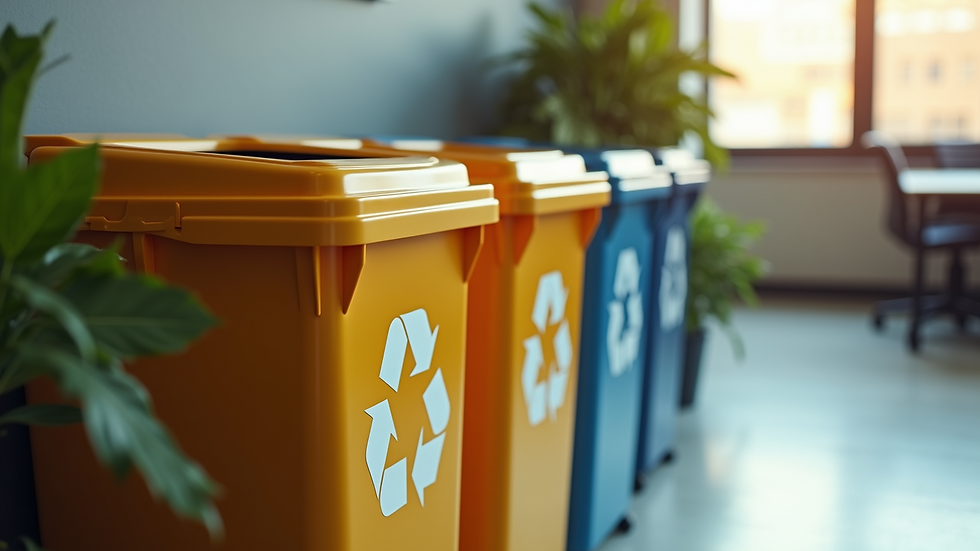Small Steps, Big Changes: Improve Your Environmental Impact Through Simple Actions
- Jul 6, 2025
- 4 min read
Updated: Nov 2, 2025

Every action we take has the potential to influence our environment, often in ways we might not immediately recognize. In today's fast-paced world, it's easy to feel that individual efforts are insignificant in the grand scheme of things. However, small, conscious actions can create ripple effects that lead to substantial changes. In this post, we will explore how our everyday decisions can collectively make a big impact on our planet.
Understanding Environmental Impact
Environmental impact refers to the effect that our activities have on the environment. This includes everything from pollution and deforestation to the depletion of natural resources. An understanding of these impacts allows individuals to make informed decisions that contribute to a healthier planet.

For example, did you know that a single plastic bag can take up to 1,000 years to decompose? This statistic highlights the importance of reducing waste and opting for sustainable alternatives. The choices we make, whether big or small, contribute to the overall health of our planet.
Daily Habits that Add Up
Habit 1: Reduce, Reuse, and Recycle
These three principles can significantly reduce the amount of waste we generate. By simply choosing to reuse items or recycle products when possible, you contribute to a cycle that lessens environmental stress.

According to the Environmental Protection Agency (EPA), recycling and composting prevented the release of about 186 million metric tons of carbon dioxide equivalent into the air in 2018. This is equivalent to the annual greenhouse gas emissions from over 39 million cars. Start small by implementing a recycling system at home. A few simple bins for paper, plastics, and metals can make a huge difference.
Habit 2: Conserve Water
Water is a precious resource, and small changes in our daily habits can conserve it. Simple actions, such as fixing leaks, taking shorter showers, or watering plants during cooler hours, can significantly impact water consumption.
Moreover, the World Health Organization (WHO) states that nearly 2 billion people are living in countries experiencing water stress. By understanding the gravity of water conservation, we can maximize our efforts to use it more wisely.
Habit 3: Opt for Sustainable Transportation
Transportation accounts for a significant share of carbon emissions. By choosing biking, walking, carpooling, or utilizing public transport, we can reduce our carbon footprint.

Statistics show that biking can reduce carbon emissions by up to 4,000 pounds per year, while public transport can save over 45 million metric tons of carbon dioxide annually. If you have a short commute, consider biking instead of driving. It not only benefits the environment but is also a great way to improve your health.
Supporting Sustainable Products and Companies
Making conscious consumer choices is an impactful way to promote sustainability. Support businesses that prioritize eco-friendly practices. Look for products made from recycled materials or those that minimize packaging waste.
Moreover, many companies are now certified as environmentally friendly. Seek out products with labels like "Fair Trade," "Organic," or "B Corporation". By choosing these brands, you help elevate practices that are kinder to the planet.
Educating Others and Staying Informed
Staying educated about environmental issues is essential to making an impact. Knowledge empowers us to make better choices and educate those around us. Engage in discussions about environmental awareness topics and inspire others to take action.
One effective way to spread awareness is through social media. Share tips on how to live sustainably or highlight local ecological efforts. Together, we can create a network of motivated individuals working towards a common goal.
Making Lasting Changes in Your Community
Get Involved with Local Initiatives
Joining or supporting environmental groups in your community can amplify your impact. Many towns have initiatives focused on tree planting, river clean-ups, or educational programs. Participating in these community efforts fosters a sense of collective responsibility and engagement.
Advocate for Policy Changes
Becoming involved in local legislation can make significant changes on a larger scale. Advocate for sustainable policies that protect natural resources. Write to local representatives about the importance of environmental issues and how they can implement sustainable practices in your town.
The Global Ripple Effect
While individual actions may seem small, collectively, they create a ripple effect that can lead to monumental changes. The movement towards sustainability is growing, and the more we commit to making eco-friendly choices, the more impact we will have.
For instance, the surge in demand for plant-based diets has shifted many industries' focus toward sustainable food production, aiding in the reduction of greenhouse gas emissions. Even minor adjustments in our diets, like reducing meat consumption, can lead to significant environmental benefits.
Embracing a Sustainable Lifestyle
Transitioning to a more sustainable lifestyle is a journey—one that requires patience and persistence. Implementing small, actionable changes can lead to a more profound commitment over time. It is essential to start where you are and build momentum.
The journey towards sustainability promotes an engaging lifestyle that connects us more deeply to our environment. Embrace the process and find joy in small victories.
Taking Part in a Greener Future
In conclusion, individual actions may seem minor in isolation, but when multiplied by millions, they create monumental changes for our planet. The future of our environment depends on each person’s conscious efforts to contribute positively. Choose to lead by example, and inspire those around you to follow suit.
Together, we can ensure a healthier planet for generations to come. As we unite in our efforts to preserve our environment, we will witness the powerful results of our combined actions. For more information on environmental awareness topics, you can refer to EvolPulse.

Comments